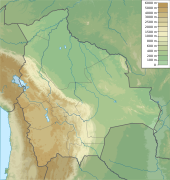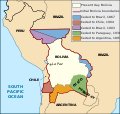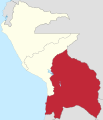Portal:Bolivia
| Portal | WikiProject | Peer Review | Assessment | Task Force |
IntroductionWelcome to the Bolivia portal
  Bolivia, officially the Plurinational State of Bolivia, is a landlocked country located in central South America. It is a country with the largest geographic extension of Amazonian plains and lowlands, mountains and Chaco with a tropical climate, valleys with a warm climate, as well as being part of the Andes of South America and its high plateau areas with cold climates, hills and snow-capped mountains, with a wide biome in each city and region. It includes part of the Pantanal, the largest tropical wetland in the world, along its eastern border. It is bordered by Brazil to the north and east, Paraguay to the southeast, Argentina to the south, Chile to the southwest, and Peru to the west. The seat of government is La Paz, which contains the executive, legislative, and electoral branches of government, while the constitutional capital is Sucre, the seat of the judiciary. The largest city and principal industrial center is Santa Cruz de la Sierra, located on the Llanos Orientales (eastern tropical lowlands), a mostly flat region in the east of the country with a diverse non-Andean culture. The sovereign state of Bolivia is a constitutionally unitary state divided into nine departments. Its geography varies as the elevation fluctuates, from the western snow-capped peaks of the Andes to the eastern lowlands, situated within the Amazon basin. One-third of the country is within the Andean mountain range. With an area of 1,098,581 km2 (424,164 sq mi), Bolivia is the fifth-largest country in South America after Brazil, Argentina, Peru and Colombia, and, alongside Paraguay, is one of two landlocked countries in the Americas. It is the 27th largest country in the world, the largest landlocked country in the Southern Hemisphere, and the seventh largest landlocked country on earth, after Kazakhstan, Mongolia, Chad, Niger, Mali, and Ethiopia. The country's population, estimated at 12 million, is multiethnic, including Amerindians, Mestizos, Europeans, Asians, Africans, Arabs, Jews and some other mixtures throughout. Spanish is the official and predominant language, although 36 indigenous languages also have official status, of which the most commonly spoken are Guaraní, Aymara, and Quechua. Bolivia experienced a succession of military and civilian governments until Hugo Banzer led a US-backed coup d'état in 1971, replacing the socialist government of Juan José Torres with a military dictatorship. Banzer's regime cracked down on left-wing and socialist opposition parties, and other perceived forms of dissent, resulting in the torturing and murders of countless Bolivian citizens. Banzer was ousted in 1978 and, twenty years later, returned as the democratically elected President of Bolivia (1997–2001). Under the 2006–2019 presidency of Evo Morales, the country saw significant economic growth and political stability but was also widely accused of democratic backsliding, and was described as a competitive authoritarian regime. Freedom House classifies Bolivia as a partly-free democracy as of 2023, with a 66/100 score. (Full article...) Selected article - Cochabamba (Aymara: Quchapampa; Quechua: Quchapampa) is a city and municipality in central Bolivia in a valley in the Andes mountain range. It is the capital of the Cochabamba Department and the fourth largest city in Bolivia, with a population of 630,587 according to the 2012 Bolivian census. Its name is from a compound of the Quechua words qucha "lake" and pampa, "open plain." Residents of the city and the surrounding areas are commonly referred to as cochalas or, more formally, cochabambinos. It is known as the "City of Eternal Spring" or "The Garden City" because of its spring-like temperatures all year round. It is also known as "La Llajta," which means "town" in Quechua. It is the largest urban center between the higher capital of La Paz and Santa Cruz de la Sierra in the tropical plains of the east. It sits south-west of the Tunari mountains, and north of the foothills of the Valle Alto. In antiquity, the area featured numerous lakes, which gave the city its name. Many of these lakes have since disappeared to urban development, but Coña Coña and Alalay lakes are extant examples. It has been a populated settlement since the Pre-Inca period, and is today an important cultural, educational, political, and commercial centre. (Full article...) Did you know (auto-generated)
Selected pictureTopicsLargest populated areas
Related portals
WikiProjectsAssociated WikimediaDiscover Wikipedia using portals New ArticlesThis list was generated from these rules. Questions and feedback are always welcome! The search is being run daily with the most recent ~14 days of results. Note: Some articles may not be relevant to this project.
Rules | Match log | Results page (for watching) | Last updated: 2024-12-17 20:15 (UTC) Note: The list display can now be customized by each user. See List display personalization for details.
| |||||||||||||||||||||||||||||||||||||||||||||||||||||||||||||||||||||||||||||||||||||||||||||||||||||||||||||||||||||||||||||||||||||||||||||||||||||






























































